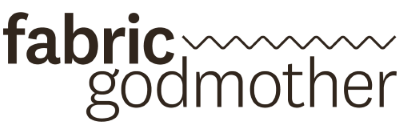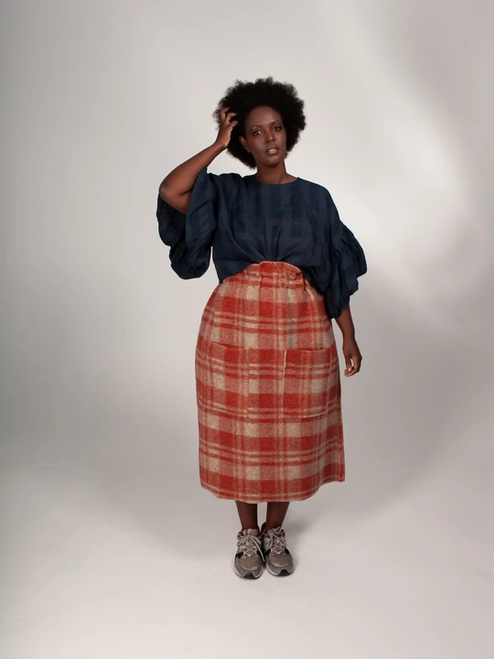Description
** THIS IS A PDF PATTERN. YOU WILL RECEIVE A LINK TO DOWNLOAD THE DIGITAL FILES IN YOUR CONFIRMATION EMAIL AFTER PURCHASE**
PLEASE NOTE: THIS PDF SEWING PATTERN IS A ZERO WASTE PATTERN, WHICH MEANS IT COMPRISES OF INSTRUCTIONS TO DRAW SHAPES DIRECTLY ONTO YOUR FABRIC. With the exception of some templates, there are no large pattern pieces to print out. The cutting plan/templates document for the ZW Bell Jacket requires printing of 11 pages in A4/US Letter Paper.
This is an oversized jacket with a rounded collar, front button closure, 3 front patch pockets, an inverted box pleat at the centre back neck, and wide sleeves that are perfect for fitting all of your winter layers underneath. The Bell jacket gets it’s name from the bell shaped sleeve, created with several darts sewn into the hem of the sleeve. This jacket is fully lined.
There are 2 size options for this jacket with slight design variations between each. The size TWO has 2 panels at the centre back body and has more of a dropped shoulder than the size ONE.
This is the first pattern we have made which has links embedded into the PDF Instruction booklet taking you to to online tutorials with colour images to help with most of the more involved sewing instructions. It also comes with 2 hack options, a shirt with a square collar and a quilted version, un-lined. Both of these have online tutorials for the extra steps.
Recommended Tools
Sewing machine, iron, chalk or dissolvable pen, scissors, large right angle ruler and/or long straight ruler.
Techniques used
Button holes, bagging out with lining, darts, patch pockets.
PDF Pattern/Instruction Booklet: Includes measurements in both metric (centimetres) and US imperial (inches). Booklet/Templates are printable on both A4 or US Letter Paper size.
This is an oversized shape with 2 size ranges. The maximum bust/hip for each size depends on the fabric width you use. Suitable for up to a 152cm / 60" hip. There are also tips in the Instruction Booklet for making adjustment to the pattern to size up further.
Size One
Width 145cm / 57" = max bust 96cm / 38", max hip 101cm / 40"
Width 150cm / 59" = max bust 101cm / 40", max hip 108cm / 42"
Width 155cm / 61" = max bust 106cm / 42", max hip 111cm / 44"
Size Two
Width 145cm / 57" = max bust 133cm / 52", max hip 142cm / 56"
Width 150cm / 59" = max bust 138cm / 54", max hip 147cm / 58"
Width 155cm / 61" = max bust 143cm / 56", max hip 152cm / 60"
Fabric Type
Ideal in a wool or heavy weight denim or heavy cotton drill. Recommended linings, something with a bit of weight that has a nice drape. Required lining width is very specific and is based on the OUTER fabric width you are using.
OUTER: Recommended Widths: 145cm - 155cm / 57 - 61 inches
LINING: Widths based on OUTER width used.
145cm / 57” OUTER = 135cm / 53” LINING
150cm / 59” OUTER = 140cm / 55” LINING
155cm / 61” OUTER = 145cm / 57” LINING
Yardage required
This is a guide only, these yardage requirements may change a little if you want to adjust the lengths of the sleeves and body. Refer to the Instruction Booklet for more.
SIZE ONE: Outer- 130cm / 51", Lining- 120cm / 47"
SIZE TWO: Outer- 150cm / 59", Lining- 140cm / 55"
Notions
FUSING/INTERFACING: Iron on fusing in a mid-heavy weight. Required to fuse the hems and collar. More on fusing in the ‘Cutting Plan’ document.
BINDING 4cm / 1.5” wide to finish the centre front bodies and back neck facing, you will require approximately 150cm / 59”.
4-5 BUTTONS approx 20mm / 3/4” in size.


The Method
Zero waste pattern cutting is a bit like a puzzle. It is a method of pattern drafting where you utilise a length of fabric end to end by strategically planning your pattern pieces so that everything is used. This pattern does not require printing of large pattern pieces, instead you draw your pattern pieces directly onto your fabric with the aid of a cutting plan and templates. We love working with this method for 3 reasons:
1. More flexibility: This method allows for easy changes such as using different fabric widths and making simple fit and design changes yourself. Using patterns that fit into a zero waste square or rectangular block is a very efficient way to work. It means that it is easier to patchwork together remnants or use left over fabrics you already have lying around.
2. An easy way to learn to self draft your own patterns : Working this way will help you to start building a toolbox of skills, and you will learn an alternative method of self drafting your own sewing patterns, which are super easy for beginners to understand.
3. Less fabric and paper waste: Without having to print full scale paper patterns for all pieces you save on a lot of paper, and you will have little to no fabric waste during the cutting and sewing process!




























